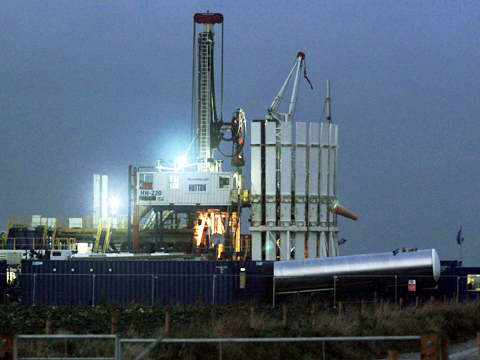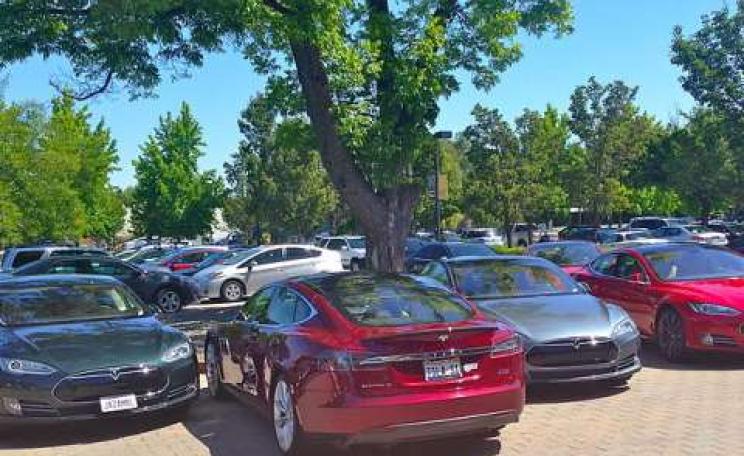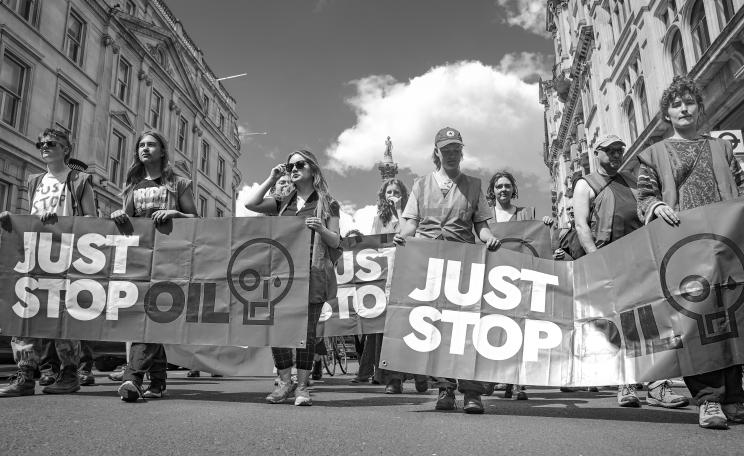The mainstream media is reporting the 'benefits' of fracking - including cheaper energy - but not the risks
The fracking (hydraulic fracturing) process entails blasting water, sand and a chemical cocktail at high pressure deep underground to cause mini-explosions which release the shale gas. It's big business in the US where it provides 25% of natural gas supplies; up from 1% in 2000.
But there are (often unreported) risks. And in a confidential report, the company Celtique Energie which is now operating in Sussex, Cheshire and the East Midlands with licences until July 2014, has stated: "The oil shale play in the Kimmeridgian interval [sub-soil strata in west Sussex] has been confirmed - the major risk is reservoir development".
This latter statement refers to drainage when extracting the reservoirs of gas that have built up - a potential hazard if they contaminate aquifers and the water table.
The report goes on to deal with the conventional oil well Celtique Energie has a stake in at Singleton South in Sussex: "This site lies close to an archaeological site which could pose problems".
Then referring to Cuadrilla, a rival fracking company with a number of UK licences including an imminent operation in Balcombe, West Sussex, the report states that they "threatened UK withdrawal to Netherlands/Poland if not supported" and are "clearly initiating a national and local debate on benefits of shale gas exploitation, quantifying local benefits - before drilling 10 more wells".
Finally Celtique's somewhat bizarre take on the issue of anti fracking protestors: "It is clear based on news reports and people contacting the company that the population... characterised by driving big 4 wheel drive vehicles are not supportive of hydrocarbon exploration".
Murmurings of direct action can indeed be heard in the not-so-sleepy environs of Balcombe, Fernhurst and Wisborough Green; but not many from the gas-guzzling 4X4 residents. These villages are three of the 15 licensed Sussex well sites and among the first of 100s countrywide sanctioned by the Government.
The mainstream media is reporting the 'benefits' of fracking - including cheaper energy - but not the risks
In response to early protest, Brighton & Hove City Council passed a "Frack Free" resolution earlier this year against the process in their area. Summing up the local campaigns, Ben Johns from UK-based campaign group Frack Off told the Ecologist: "The whole economic case is overplayed and exaggerated while the dangers of water contamination and air pollution are glossed over - and that's why people in Sussex are prepared to take action".
"You only have to look at the Facebook postings to see that villagers from Fernhurst, Wisborough Green and Markwells Wood are all organising against this.
"Balcombe is ahead of the game, with villagers going house to house and signing each other up. And not just a petition: there's also a commitment to get out and actively oppose any development.
"Non-violent and non-negotiable is the catchphrase. At a spacing of four wells per square mile, full scale development could mean 32 wells within the parish and over 300 within five miles.
"Twenty locals turned up to a recent non-violent direct action training while down the road in Cuckfield a Tory West Sussex County councillor said [at a 100 plus meeting] there was nothing he could do about it and the best way to stop it was for locals to take direct action"
But in December, the Department of Energy and Climate Change (DECC) announced it was lifting its ban, opening up drilling sites across the county. The lifting of the ban has led to new controls designed to reduce the risk of seismic activity following two fracking-related earthquakes near Blackpool in 2011. Further regulations include full disclosure of what chemicals are used in contrast to the US where ‘proprietary status' means the frack fluids mix stays unknown.
Campaigners here though fear that Sussex and beyond will become home to tens of thousands of wells, access roads, pipelines, compressor stations and waste ponds. And looking to 1,350 documented cases in the US, they talk of methane leaks (17 times more damaging than CO2), water contamination (60% of our water comes from underground aquifers), air pollution, and chronic health conditions and cancers that have hit isolated communities there, in Canada and Australia.
Katriona Farrell, 28, a language teacher, from Balcombe, explained what she was doing in her community where the latest poll showed more than 80% of villagers opposed the plans: "I came to the campaign because I was horrified at what I discovered once I watched Gaslands [a US documentary], and then looked into the evidence myself of what fracking was doing to wildlife and people across the world.
"The gas industry's tactic is 'divide and conquer' - splitting communities with bribes and buying off key landowners - so we must do the opposite by uniting and organising. We will do anything for everyone to get involved in from making cakes, writing letters, 'knit ins', to peaceful direct action and blockades.
"This Lock The Gate strategy has been adopted by over 90 communities [worldwide] and since January has forced three gas companies out of those areas. It works because it shows that the community gives no social licence to the companies."
One of these ‘forced' departures was in Australia. On a recent UK visit, Jenny Dell explained how a determined and protracted presence at the gate of the planned well sites was how they "forced Dart Energy to quit Australia". Dart is now one of the companies with a UK arm.
Nicola Peel another international activist living in Pulborough, has witnessed first hand the oil industry's deleterious effect on Amazonian communities, her film Blood of the Amazon documenting the downsides. She is opposing the controversial frack plans in Wisborough Green, and told the Ecologist: "Re the Celtique application I find it amazing to think we're now in 2013 and still playing with the dinosaurs.
"With all the fantastic technological advances in small-scale hydro, wind, solar, tide and wave why are we still looking to extract resources which will only last for a couple of years? Now's the time to move into a new Era of Co-operation and out of the Age of Extraction and Destruction so we work with the Earth rather than against it. It is inevitable, the only question is when."
The campaigners are lined up against an increasingly vociferous pro-fracking lobby which reaches deep into central government: Tory and Lib- Dem ministers, non executives from the fracking industry within government departments, and loosely affiliated, industry-backed, climate change deniers.
The pro-lobby is still riding high on the back of a recent British Geological Survey which claims that 1,300 trillion cubic metres of shale gas lie in the rich seams of northern England, enough for decades of ‘cheap' energy provision.
If Cuadrilla extracted just 10% of that, it would amount to more than all of the North Sea Oil accrued thus far. And although Frack Off campaigners point out that on occasions only 1% of the gas can be extracted that of course still opens the door for Shell and BP etc to take over from the smaller firms with vested interest and fossil fuel lobbying having already laid the foundations.
Energy Secretary Ed Davey is championing fracking as "a promising new potential energy resource for the UK". Fracking is supported by the G8 and was rumoured to have been on the agenda at the secretive Bilderberg meeting in the UK earlier this summer.
George Osborne has now announced 62% tax breaks putting the UK "at the forefront" of the industry with a projected £3.7bn investment per year creating around 70,000 jobs.
So with Balcombe now firmly within its sights, Cuadrilla is preparing to start exploratory work imminently, and not least because its planning permission runs out in September.
Campaigners here fear the consequences of water contamination and seismic activity with the well site less than a mile from the Ardingly Reservoir (serving more than 65,000 homes), and effects on the London to Brighton railway line's Grade II listed viaduct, as well as the River Ouse.
But Francis Egan new chief executive at Cuadrilla has played down the concerns stating: "We believe that onshore oil and gas exploration is essential for UK energy security and economic development and that these activities can and will co-exist with local communities and environmental protection."
With a well using on average 5m gallons of water, campaigners are also asking how Southern Water would cope in a drought year and how local farmers would feel about their irrigation channels drying up.
Karen Hoy spokeswoman for Southern Water said: "Companies which want to carry out fracking in the Southern Water region would need to apply to use water. Whether permission would be granted would depend on the amount required, if a water main suitable for supply was available and the supply of water for fracking must not impact on water pressure levels on other customers.
"The fracking companies could also apply to the Environment Agency for permission to abstract water directly from the environment via a borehole. Southern Water has not received any applications at this time." Mr Egan claims the planned test drilling at Balcombe "will use 500m3 of water, less than half the contents of an average 50 metre swimming pool".
However, the visual impact - with a 40ft flare stack planned for Balcombe, is another element to contend with. What with the newly minted South Downs National Park and a number of Areas of Outstanding Natural Beauty (AONBs) and Sites of Special Scientific Interest an even wider constituent of middle England - represented by the Campaign for the Protection of Rural England (CPRE) and the National Trust - is becoming increasingly unhappy with the intrusive nature of the proposed well sites. The National Trust has already refused Celtique access to its land.
The problem is one of expansion owing to the fact that gas extraction levels in a well can decline after the first few months and then dry up, leading to the constant need for new wells until the seam is exhausted.
America has areas like Bradford in Pennsylvania with 2,000 wells sunk in five years, in a place 80% the size of Sussex. Tens of thousands of workers are employed with vast sums of money involved: $30-50m of capital can go into a 10-well frack pad - with exponentially high returns.
The Government here is suggesting fracking companies will be asked to plough back some of that money into new amenities or infrastructure for residents affected, with Whitehall looking at diverting taxes paid by drilling companies into communities. Campaigners are not buying this, pointing instead to the bigger picture of huge private corporations like Google and Starbucks finding ways round this and reaping the rewards with tax havens in offshore accounts.
STOP PRESS:
Since Cuadrilla attempted to start moving heavy machinery
onto the Balcombe site last Thursday (July 25) there has been a constant presence and camp of villagers and activists sometime numbering over 100 people with over 12 arrests so far.
For regular updates on Sussex anti fracking campaigns see:
Frack-free Sussex page on Facebook
Sussex Extreme Energy Resistance page on Facebook
Friends of the Earth page on fracking, with video and detailed briefing
Jan Goodey is a freelance journalist.
| READ MORE... | |
 |
INVESTIGATION Fracking hell: the big story A unique collaboration between The Ecologist and Link TV lifts the lid on fracking and the shale gas boom sweeping into Europe and beyond... |
 |
NEWS ANALYSIS Environment chief backs gas 'fracking' and nuclear in the UK Lord Smith, chairman of the Environment Agency, joins the calls for a gas 'fracking' boom, saying it would provide 'energy security' |
 |
NEWS Growing pressure for moratorium on UK shale gas 'fracking' Shadow energy minister Huw Irranca-Davies calls for a halt to shale gas drilling after an Ecologist investigation and Tyndall Centre report highlight environmental risks of hydraulic fracturing |
 |
INVESTIGATION UK gas fracking boom 'may be dirtier than coal' As well as local outrage over 'fracking' drilling there is new evidence its greenhouse gas footprint may be higher than that of coal. Tom Levitt reports from the centre of this potential gas boom near Blackpool |
 |
NEWS ANALYSIS Middle England and eco-activists unite in opposition to shale gas and fracking In a perfect storm, Middle England is joining forces with climate activists to say no to fracking and the UK's much-talked about shale gas boom |







